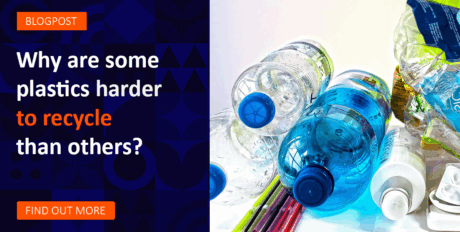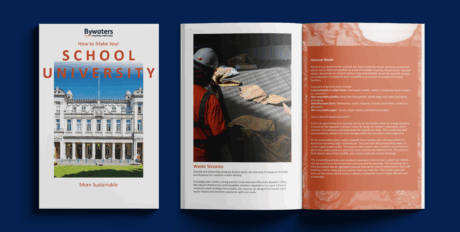Contact us today for your Free Quote
At Bywaters, we’re committed to sustainable waste management and ensuring the safety of our staff and the environment. A crucial part of this is making sure the right things go into the right bins. While you might be a champion recycler or diligent with your general waste, there are certain dangerous items that pose significant risks if placed in standard recycling or general waste bins.
Putting these hazardous materials in your regular bins can lead to fires in collection vehicles or processing facilities, release toxic chemicals into the environment, and cause serious injury to waste management personnel. Understanding these risks and knowing the correct disposal methods is vital for everyone’s safety and for protecting our planet.
This guide highlights common household items that should never be placed in your standard recycling or general waste bins and explains the dangers they present. For businesses, understanding and complying with hazardous waste regulations is a legal requirement. You can find official guidance on hazardous waste: producers and holders on the UK government’s website.
The Fiery Truth: Highly Flammable or Explosive Materials
These items are a major cause of fires in waste management streams. The friction and pressure from collection and processing equipment can easily ignite them.
- Aerosol Cans (even seemingly empty ones): Residual propellants can cause these to explode under pressure.
- Proper Disposal: While some local councils accept empty aerosols in household recycling, it’s essential to check your specific local guidelines. Partially full cans should be treated with caution and often require hazardous waste disposal.
- Fuels (Gasoline, Propane, Kerosene, etc.): Highly volatile liquids and gases that are extremely flammable.
- Proper Disposal: Never pour fuels down drains or place them in any bin. These require specialised collection and disposal by licensed hazardous waste professionals.
- Lighter Fluid: Another highly combustible liquid.
- Proper Disposal: Should be disposed of via designated hazardous waste routes.
- Fireworks and Flares: Contain explosive materials that can be accidentally triggered.
- Proper Disposal: Unused or expired fireworks and flares are highly dangerous. Do NOT put them in your bins. Seek advice from your local authority or emergency services on safe disposal methods, which may involve specialised contractors.
- Ammunition: Explosive by design and incredibly dangerous if mishandled.
- Proper Disposal: Never dispose of ammunition in household bins. Contact your local police force immediately for guidance on safe handling and disposal.
The Toxic Threat: Chemicals and Hazardous Substances
These materials can leach harmful substances into the ground and water, causing environmental damage and posing health risks.
- Paint (Liquid): Particularly oil-based paints contain hazardous chemicals.
- Proper Disposal: Liquid paint is considered hazardous waste. Some local recycling centres accept paint; check their guidelines. Dried-out water-based paint may be accepted in general waste by some councils but verify this locally. Consider donating usable paint to community projects.
- Solvents (e.g., Paint Thinner, White Spirit): Flammable and can release toxic fumes.
- Proper Disposal: Require disposal at a designated hazardous waste collection site.
- Pesticides, Herbicides, and Fertilizers: Contain chemicals harmful to ecosystems and human health.
- Proper Disposal: These must be disposed of as hazardous waste at a licensed facility.
- Strong Cleaning Chemicals (e.g., Concentrated Bleach, Drain Cleaner): Can cause chemical reactions and release dangerous fumes.
- Proper Disposal: Small, diluted amounts of common household cleaners might be permissible in general waste (check local rules), but concentrated or large quantities are hazardous and need appropriate disposal. Never mix different cleaning products.
- Batteries (especially Lithium-ion and Lead-acid): A major cause of fires in waste streams due to the risk of thermal runaway (lithium-ion) and leakage of corrosive and toxic materials (lead-acid). The potential consequences of improper battery disposal are significant!
- Proper Disposal: Batteries should never go in general waste or standard recycling bins. Look for battery collection points at retailers, supermarkets, or your local household recycling centre. Car batteries require specialist disposal points like garages or civic amenity sites. For businesses requiring safe and compliant battery disposal, Bywaters offers dedicated battery recycling services.
- Fluorescent Light Bulbs and Tubes: Contain small amounts of toxic mercury.
- Proper Disposal: These should not be placed in general waste or standard recycling. They need to be taken to designated collection points, often found at household recycling centres or some electrical retailers.
- Mercury Thermometers: Contain toxic mercury that is released if the thermometer breaks.
- Proper Disposal: Treat as hazardous waste. Contact your local authority for guidance on safe disposal points.
The Biohazard: Medical Waste
Improperly disposed of medical waste poses significant risks of injury and the potential spread of infection.
- Needles and Syringes (Sharps): Can cause serious needlestick injuries.
- Proper Disposal: Used sharps must be placed in a dedicated sharps bin. Contact your local council or healthcare provider to arrange for a sharps bin and its safe collection and disposal. Never put loose sharps in any bin.
- Medications (Prescription and Over-the-Counter): Can contaminate water or be misused.
- Proper Disposal: Do not flush medications or put them in your bins. Return unused or expired medicines to a pharmacy for safe disposal.
- Infectious Waste (e.g., Contaminated Dressings, Swabs): Can contain harmful pathogens.
- Proper Disposal: For businesses and healthcare settings, proper clinical waste disposal is essential and legally required. At Bywaters, we offer compliant and secure clinical waste management services to ensure safe handling and disposal of infectious materials. For domestic waste, small amounts of non-sharp infectious waste might be accepted in tightly sealed bags in general waste by some councils but always check local guidelines.
Other Items Requiring Special Care
Some other common items require specific handling due to their hazardous nature or composition.
- Asbestos: A highly dangerous material that can cause fatal lung diseases if fibres are inhaled.
- Proper Disposal: Asbestos disposal is strictly regulated and must only be handled by licensed professionals. Never attempt to remove asbestos yourself without proper training and equipment. Bywaters provides hazardous waste management services that can include the compliant disposal of certain types of asbestos, following all safety protocols and regulations. Always consult with experts and your local authority.
- Car Batteries: Contain corrosive acid and toxic lead.
- Proper Disposal: As mentioned earlier, these require specialised collection points and should not go in household bins.
- Used Motor Oil and Antifreeze: Toxic liquids that can severely pollute the environment.
- Proper Disposal: Never pour these down drains. Take them to a household recycling centre with facilities for collecting waste oils and antifreeze.
- Electronic Waste (WEEE – Waste Electrical and Electronic Equipment): Items like old computers, phones, and TVs contain valuable materials but also hazardous substances.
- Proper Disposal: WEEE should not go in general waste. Bywaters provides comprehensive WEEE recycling services to ensure that electronic waste is safely processed, valuable materials are recovered, and hazardous components are handled responsibly. You can also use retailer take-back schemes or designated collection points at household recycling centres. Businesses can find in-depth information on compliant WEEE management in our guide “Managing Electronic Waste: A Business Guide to WEEE Waste”.
- Vapes: Increasingly common, vapes often contain lithium-ion batteries, chemicals in e-liquids, and plastics, posing environmental and safety risks if not disposed of correctly. The UK government is banning single-use vapes from June 2025 due to these concerns.
- Proper Disposal: Vapes should never be put in general waste or standard recycling bins. Due to their electronic components and batteries, they should be treated as WEEE. Many retailers that sell vapes offer take-back schemes. You can also recycle vapes at household waste recycling centres that accept small electricals. For more detailed information on recycling vapes, refer to resources like Recycle Now’s guidance.
Partnering for Safe and Responsible Disposal
Properly disposing of hazardous waste is not just about following rules; it’s about protecting people and the planet. Many of the items listed require specialized handling and disposal methods beyond standard kerbside collections.
At Bywaters, we have the expertise and facilities to safely and compliantly manage a wide range of hazardous waste streams for businesses. From chemicals and clinical waste to batteries and WEEE, we ensure your hazardous materials are handled responsibly, minimizing risk and environmental impact.
Learn more about our Hazardous Waste Management Services or get a quote today to discuss your specific hazardous waste disposal needs.
By working together and correctly identifying and disposing of dangerous items, we can all contribute to a safer and more sustainable future.
More posts:
Valentine’s Day: History, Tradition, and Its Modern Impact
This post traces the evolution of Valentine’s Day from ancient Roman rituals to a global commercial event. It highlights the holiday’s hidden environmental impact and offers a guide to celebrating sustainably through “Circular Romance” and waste reduction.
Read morePlastic Recycling: Why Are Some Types Harder to Process Than Others?
Some plastics recycle easily, while others are difficult or impractical to process at scale. This article explains why material type, packaging design, contamination and recycling infrastructure all play a role, and what businesses can do to improve plastic recycling outcomes in the UK.
Read moreThe Ultimate Guide For a Sustainable School and University
Download The Ultimate Guide For a Sustainable School or University. Get the roadmap to cut costs, reduce your carbon footprint, and boost your ESG profile with 5 core pillars.
Read more




